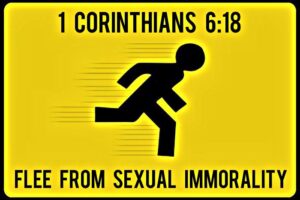Moral Anarchy

In my earliest remembrances the godless were engaged in a sexual revolution. The hippies and the potheads, and anyone they were able to seduce, were engaged in “free sex.” Like the animals, they saw every member of the opposite sex as a potential sexual partner, and made it a point to have as many partners as possible.
As time passed, there was a gradual broadening of their debauched morality. First, it was only behind closed doors, but gradually they came “out of the closet”—people who would engage in unnatural sexual acts with members of their same sex. Society was shocked, but gradually politicians and perverts showcased their putrid amorality to appeal to the unwary who were abandoning God and common sense for the pleasures of “sin for a season.”
Today, the flood gates are opened. Much of humanity embraces moral anarchy, believing that they are their own gods, possess their own truth and write their own moral laws. There is even the mistaken notion that one can, by imagining it so, change his or her sex or gender.
What does God have to say about all of this? “Nevertheless, to avoid fornication, let every man have his own wife, and let every woman have her own husband. (1Corinthians 7:2)” “Thou shalt not lie with mankind, as with womankind: it is abomination. (Leviticus 18:22)” “So God created man in his own image, in the image of God created he him; male and female created he them. (Genesis 1:27)” “The woman shall not wear that which pertaineth unto a man, neither shall a man put on a woman’s garment: for all that do so are abomination unto the LORD thy God. (Deuteronomy 22:5)
The first chapter of Romans describes the path of this invasive cancer of sin, and its consequences. “Wherefore God also gave them up to uncleanness through the lusts of their own hearts, to dishonour their own bodies between themselves: (Romans 1:24)”
But there is a cure for our personal and societal ills: “For the wages of sin is death; but the gift of God is eternal life through Jesus Christ our Lord. (Romans 6:23)”…the blood of Jesus Christ his Son cleanseth us from all sin. (1John 1:6)”




